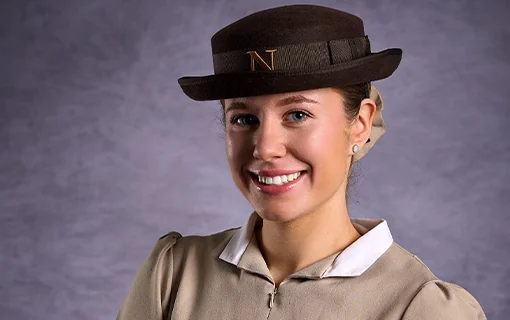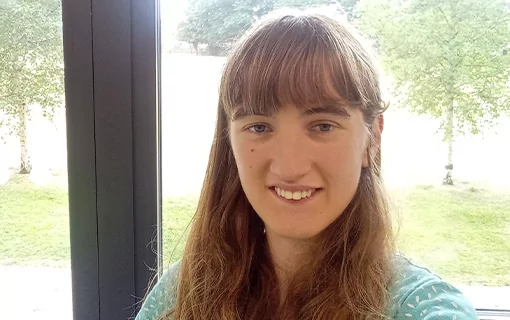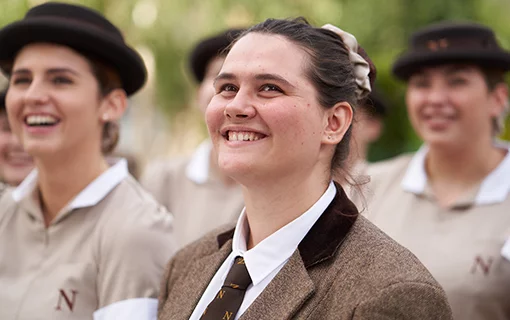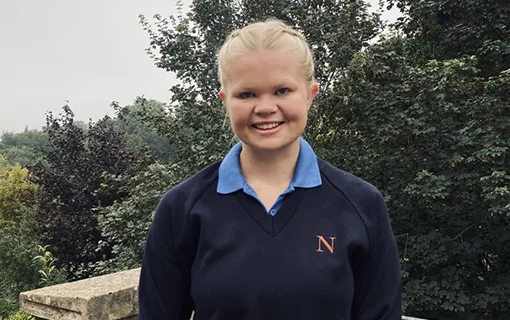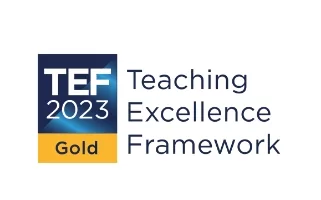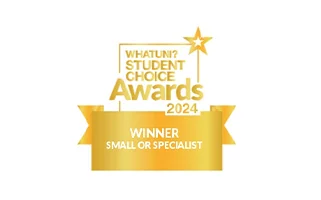Bursaries and financial support
Discover Norland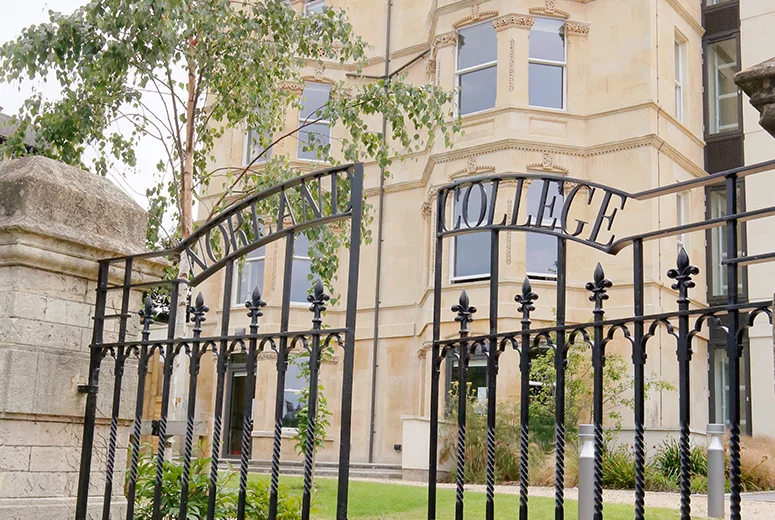
Supporting you with study and living costs
There are several financial options available to help with your study and living costs:
- Our Emily Ward Bursary scheme provides a small number of means-tested bursaries.
- You may be eligible for a government student loan to cover some of your tuition fees and living costs.
- Students from overseas Commonwealth countries may be eligible to apply for a Royal Commonwealth Society, Bath and District Branch Scholarship.
- Some Norland students have successfully obtained grants and bursaries through scholarships or awards from organisations they have links with.
- Many students work whilst studying and during the holiday periods and there is strong demand for Norland students to provide help with childcare.
- We offer a fees payment by instalment plan across the academic year to help to spread the costs.
- While living costs will vary dependent on your circumstances, budgeting and planning ahead will help your money go further.
Further information on financial support and advice is given below.
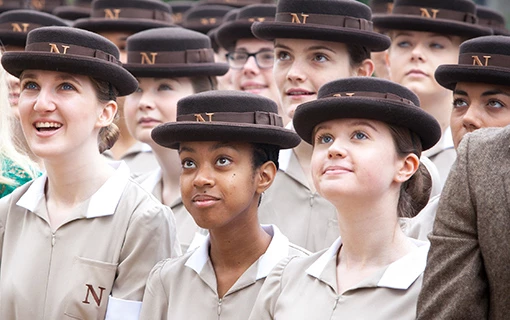
Emily Ward Bursary
The Emily Ward Bursary scheme, named after Norland’s founder, provides a small number of means-tested bursaries each year. In the past five years, Norland has awarded over £1,000,000 in bursaries providing around one in four students with financial support.
In 2023/24, £305,238 was awarded in bursary funding, providing 25% of all students with valuable financial support
Awards available for new first-year students beginning their studies at Norland in 2024 along with eligibility criteria are detailed below.
We have a limited pot for bursaries, so please ensure you have an alternative funding plan in place before you accept your offer of a place from us.
- Up to five Emily Ward Bursary awards of £10,000 for each year of study for the duration of the three-year course.
Eligibility: New first-year students (UK and international) with a household income of £42,875 or less. Preference will be given to students who meet one or more of the Widening Participation criteria below.
- Up to eight partial Emily Ward Bursary awards of £5,000 for each year of study for the duration of the three-year course.
Eligibility: New first-year students (UK and international). Preference will be given to lower income households and students who meet one or more of the Widening Participation criteria below. Students who are successfully awarded the Emily Ward Bursary of £10,000 will not be eligible for a partial award.
The panel may decide to award additional smaller bursaries at its discretion to students that meet its funding criteria below.
All Emily Ward Bursary recipients will also benefit from the Emily Ward enrichment programme alongside our student support package.
At least 10 Emily Ward Uniform Bursary awards of £500 as a one-off contribution towards the cost of purchasing the Norland uniform in the first year of study only.
Eligibility: Open to all new first-year students (UK and international). Preference will be given to lower income households and students who meet one or more of the Widening Participation criteria below.
All bursaries are means-tested. Additional consideration is given to applicants who meet one or more of our Widening Participation criteria as follows:
- your home address is in an area where there is a low participation of young people progressing into higher education, as measured by the OfS (UK residents only).
- your home address is considered to be in an area of general disadvantage according to Indices of Multiple Deprivation (UK residents only).
- you, your partner or a parent or guardian receive a UK state means-tested benefit, including Child Tax Credits, Working Tax Credits, Housing Benefits, Council Tax Benefits, Disability Living Allowance or Personal Independence Payments, Income Support or Income-based Job Seekers Allowance, Income-related Employment and Support Allowance, Pension Credits, Universal Credits etc.
- you are care experienced, a care leaver or Foyer resident – you have experienced care, are a care leaver or have lived in a Foyer before starting at Norland, or are supported by a local authority Leaving Care Service and fulfil the criteria as stated in the Children (Leaving Care) Act 2000: A young person aged 16-25 years old who has been ‘looked after’ for at least 13 weeks by a local authority at some point since they were 14 years old, and were in care on or after their 16th birthday.
- you are irreconcilably estranged from your parents or guardians.
- you are a young adult carer – aged between 18 and 25 and look after a relative or friend of any age due to disability, chronic or terminal illness, mental health problems, alcohol or drug addiction/dependency, and are aged 25 years or under at the start of the course.
- you are a refugee or asylum seeker.
- you are of male or non-binary gender.
- you identify as Arab, Asian (including Bangladeshi, Chinese, Indian, Pakistani and other Asian backgrounds), Black (including African, Caribbean and other Black backgrounds), Mixed Heritage (including Asian and White, Black African and White, Black Caribbean and White and other Mixed backgrounds) or any other heritage that diversifies Norland’s student body.
- you are a mature student aged 25 years or over at the start of the course.
The deadline for bursary applications to be submitted for 2025 entry is Friday 25 April 2025.
You must have already been offered a place (conditional or unconditional) to study at Norland in order to apply for a bursary. Offer-holders can apply to all three bursaries as long as they meet eligibility requirements. All bursaries are dependent on the completion of an application form, which is considered by the Norland Bursary Committee.
If you are offered a place on our course, whether conditional or unconditional, bursary information and application details will be sent to you. Bursary applicants will be notified as soon as possible after a decision has been made, usually by the end of May.
If successful, the Emily Ward Bursary will be awarded for the entire duration of the three–year course, subject to the successful completion of each year. The Uniform Bursary is a one-off contribution in the first year of study only.
Loans and grants
The Office for Students (OfS) has registered Norland as an approved provider of Higher Education. This means that if you are an eligible student from England you will be able to access financial support through the Student Loans Company towards the cost of tuition fees and living costs.
You can apply to Student Finance England for a tuition fee student loan of up to £6,165 per year. The amount you apply for is paid directly to Norland by Student Finance England. You will be responsible for paying the difference between the fee loan borrowed and the total tuition fee payable to Norland. The loan is not means tested and you will only need to start paying back the loan once you have left the course and are earning over £25,000.
You can also apply to Student Finance England for a student loan to contribute towards your living costs, a portion of the loan is means-tested. You can start to pay this loan back at the same time as you start paying back your tuition fee loan.
There is a different process for applying for student finance if you are from Scotland (visit the Student Awards Agency Scotland), Wales (visit Student Finance Wales) or Northern Ireland (visit Student Finance NI).
Other ways to help finance your studies
Termly fees collected by Direct Debit, may be paid over eight instalments, due on or around the 1st of October, November, December, February, March, April, May and June. For more information on this scheme please contact the Finance team at [email protected]
The Royal Commonwealth Society, Bath and District Branch is an educational charity working in Bath and District (postcode BA), whose aim is to promote understanding and development of the Commonwealth of Nations. This scholarship is available to support students from overseas Commonwealth countries to assist them with the costs of their studies and training at Norland.
The scholarship provides a one-off grant of up to £500.
The scholarship is open to successful applicants:
- whose main place of residence is in an overseas Commonwealth country
- who have accepted the offer of a place and enrolled at Norland
- who can demonstrate that they support and give back to their overseas Commonwealth community.
How to apply
Applicants are required to:
- Complete the Royal Commonwealth Society, Bath and District Branch Scholarship application form.
- Write a short essay to demonstrate how the Norland integrated degree and diploma course will benefit the community in their country of residence and their future career (no more than 500 words).
- Return the application form and short essay to the Norland finance team at [email protected].
The deadline for scholarship applications for 2024 entry is Monday 30 September 2024.
Applicants whose main place of residence is in an overseas Commonwealth country will be sent an application form. The selection of scholarship recipients will be decided by a panel of representatives from the Royal Commonwealth Society, Bath and District Branch and Norland.
Successful applicants will be required to acknowledge the support provided by the Royal Commonwealth Society, Bath and District Branch Scholarship and to provide a short report on their studies and training and the benefit provided to their community by the Scholarship. It is a condition of the scholarship that recipients will be publicised on the Norland website, social media and in the media and will be expected to provide appropriate feedback to support this. They are also encouraged to interact with the Royal Commonwealth Society, Bath and District Branch membership at meetings and events.
UKCISA (the UK Council for International Student Affairs) provides a range of information and advice for prospective and current international students, including immigration, fees, student support and living in the UK.
Finder and Studee also provide useful funding information for international students.
The Department of Veterans Affairs provides grants to US students from military families.
In previous years, Norland students have successfully obtained grants and bursaries through scholarships or awards via their local councils, organisations that they may have volunteered with, through links with past employers, or through community funding.
Many students work whilst at Norland and during the holiday periods. There is a strong demand for Norland students to provide childcare duties. We support students to find nannying and babysitting jobs through our Job Shop and our partnership with the Marvellous Babysitting app. Students also work within childcare settings in ski resorts, hotels, summer sun holiday destinations and cruise ships. However, it should be acknowledged that the Norland course is demanding, and home study expectations are high, therefore caution should be exercised to ensure any work commitments do not affect your studies.
All students have the opportunity to work for Norland, creating a valuable source of student income. We employ Student Charity Reps, Student Librarians, Student Brand Ambassadors as well as Staff and Student Liaison Committee (SSLC) members. These vital posts give students the opportunity to play an important role within Norland, supporting fellow students, Norland initiatives and enabling effective communication between staff and the student body. All students are encouraged to get involved.
In 2022/23, we surveyed our students about their part-time and holiday work:
- 84% worked during term time, mostly in babysitting or nannying roles.
- While the hourly rates for jobs varied, the average hourly rate was £11 for babysitting and nannying work during term time. Students worked on average around 12 hours per week in these roles.
- 94% worked during the holidays, mostly in childcare roles.
- The average holiday hourly rate was £10.50 for babysitting and nannying. Students worked anywhere between a few hours each week up to full-time work throughout the holiday period. Students worked in locations across the UK as well as overseas in Greece, Switzerland, South Africa, France, Spain and the US.
Please note: Norland was granted our licence from UKVI to become a student sponsor in April 2021. Until we have proven a track record of compliance (which is granted after four years of consistent and successful student sponsorship) there are some limitations on permitted student activity. This means that Student visa holders with Norland as their sponsor cannot work in the UK at any time. This includes voluntary work.
Some students choose to defer their course start date by a year or more to allow additional time to finalise financial arrangements. Please contact us if you would be interested in this option by emailing [email protected]
The Norland Finance team are committed to making a Norland education as accessible as possible to all of our prospective and current students. For supportive, practical help and advice regarding financing your course, whether as a future or current student, you are strongly encouraged to contact our approachable Finance team via email at [email protected]
Blackbullion provides help with financial planning and money skills for students and Money Helper offers general financial guidance. The living costs and budgeting section below provides additional advice and links to further guidance.
Students share how they fund their studies and budgeting advice
Further financial information
Tuition fees and study costs
Information on tuition fees, lifelong learning fee and other costs of studying at Norland.
View feesLiving costs and budgeting
Information about funding the cost of living as a student in Bath.
View pageValue for Money statement
We pride ourselves on creating and maintaining a curriculum that delivers good value for money for students.
Read statementRead our prospectus
Sign up to our mailing list to receive the latest study news and information about our open days, funding opportunities and student life.
